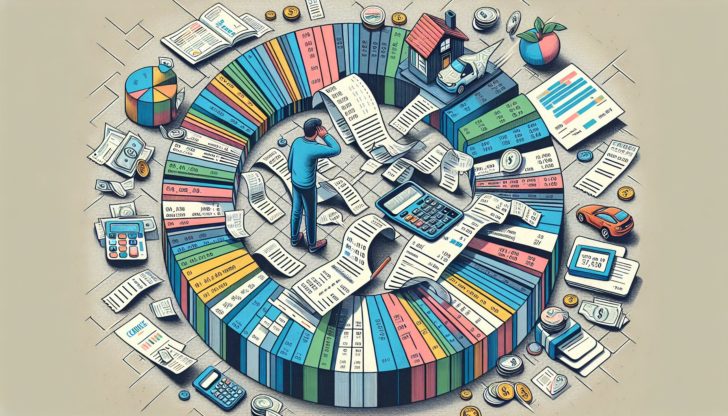Looking to master your finances? Grasping the concept of financial literacy is key to success. It empowers you to navigate money matters—from budgeting to investing—with certainty. This article outlines actionable tips to enhance your understanding and practical application of financial literacy, helping you attain financial stability.
Table of Contents
Key Takeaways
Financial literacy is the ability to understand various financial concepts such as personal financial management, budgeting, and investing, with the aim of making informed financial decisions.
Building a strong financial foundation involves mastering key components including budgeting, saving, investing, and understanding credit and debt management.
Improving financial literacy across diverse communities requires targeted education, and there are many resources available to support this continuous learning process, including online courses, books, and publications.
Understanding Financial Literacy

Financial literacy is the compass that guides one’s journey to financial stability. It is the ability to understand and utilize different financial skills, such as personal financial management, budgeting, and investing. It is the foundation upon which individuals, families, communities, and even nations build their economic health.
The journey of financial literacy begins with understanding basic financial concepts and ends with achieving financial literacy, where individuals can make informed financial decisions, reducing financial stress and enhancing their financial future.
Defining Financial Literacy
At its core, financial literacy is about making sense of your money. It’s the ability to find, understand, and use resources and information to make informed decisions about personal finances. The journey towards attaining financial literacy involves mastering a range of financial literacy skills and components.
These skills foster confidence, knowledge, and the ability to make solid financial decisions, promoting financial self-sufficiency, stability, and well-being.
The Role of Financial Education
Financial education is a critical pathway to achieving financial literacy. It equips individuals with the knowledge and skills required to navigate the complex world of personal finance. It is not just about:
reading personal finance materials
using management tools
engaging with advisors
monitoring spending habits
learning to make informed financial decisions
With the right financial education, individuals can improve their credit scores, manage their debt wisely, and reduce their financial stress.
Building a Strong Financial Foundation

Building a solid financial foundation is akin to constructing a sturdy house – it requires careful planning, the right tools, and consistent effort. The pillars of this foundation are:
Banking
Budgeting
Saving
Credit
Debt
Investing
These components work in tandem to provide the stability needed for achieving financial literacy and ultimately, financial stability, all while considering the role of the federal reserve bank.
Let’s delve deeper into these pillars.
Budgeting for Success

Budgeting is the blueprint of your financial house. It involves tracking income and expenses, creating a spending plan, and adjusting your budget as needed. It’s about allocating money to your needs, savings, and wants in a balanced manner.
Effective budgeting helps you manage your finances better, creating a solid foundation for financial security and prosperity.
Saving Strategies

The cornerstone of a strong financial foundation is a robust savings plan. An emergency fund acts as a protective shield, buffering you against unforeseen financial emergencies. Adding to this fund consistently, especially through automated savings deposits, ensures you’re always prepared for a rainy day.
It’s not just about saving for emergencies, but also planning for short-term goals and larger anticipated expenses, providing a multi-layered safety net for your financial future.
Smart Investing
Investing is the tool that helps your financial house grow over time. Deciding on investments involves understanding factors such as interest rates, diversification, and risk mitigation. It’s about leveraging the power of compound interest and the passage of time to grow your investments.
By diversifying your investments and regularly assessing your portfolio, you set yourself up for long-term financial growth and stability.
Navigating Debt and Credit

Just as a house needs constant maintenance, so does your financial foundation. Managing credit effectively and understanding credit scores are critical for maintaining a good reputation as a borrower. It’s about making informed decisions about borrowing and managing your debt wisely.
Let’s delve into this aspect of financial literacy.
Understanding Credit Scores
Your credit score is like the health check-up of your financial house. It’s a numerical expression of your creditworthiness, influenced by factors such as payment history, total amount owed, and length of credit history.
A good credit score can open doors to financial products and opportunities, making it an essential component of your financial literacy journey.
Managing Debt Wisely
Managing debt is akin to preventing cracks in your financial house. It involves borrowing responsibly, actively assessing and reducing your debts, and utilizing resources to improve your debt management skills when you borrow money.
By managing your student loan debt wisely, you maintain your overall financial health and safeguard your financial future.
Insurance and Protection
Insurance is the protective layer of your financial house, providing baseline financial protection against unforeseen events. Different types of insurance cover different situations, ensuring that your financial stability is protected no matter what life throws your way.
Health Insurance Essentials
Health insurance is like the health insurance of your financial house. It’s designed to cover medical expenses and provide financial protection against high costs associated with healthcare.
Having comprehensive health insurance coverage can protect you from unexpected medical bills that could otherwise derail your financial stability.
Life and Disability Insurance
Life and disability insurance are the safety nets of your financial house. They provide financial protection to beneficiaries in the event of a fatal or debilitating accident or illness. In essence, they ensure that your financial goals, such as education and estate planning, can still be achieved even in the face of adversity.
Retirement Planning and Long-Term Goals
Retirement planning and long-term goals are like the future extensions of your financial house. They involve setting clear financial objectives, estimating future expenses, and diversifying investments to ensure financial stability in retirement.
Preparing for Retirement
Preparing for retirement is like future-proofing your financial house. It involves estimating the funds needed, adopting appropriate investment strategies, and developing a plan for withdrawing from retirement accounts.
With the right preparation, you can ensure a comfortable and secure retirement.
Long-Term Financial Planning
Long-term financial planning is like laying the groundwork for the future expansions of your financial house. It involves investing in various financial vehicles, including financial futures, and setting aside funds for larger expenses, such as education or home purchases.
By planning for the long term, you secure your financial future and ensure the sustainability of your financial house.
Enhancing Financial Literacy for Different Communities
Financial literacy is not a one-size-fits-all concept, and different communities face unique challenges when it comes to achieving financial literacy.
Let’s explore how we can enhance financial literacy for women, minorities, and first-generation Americans with the help of the National Financial Educators Council.
Women and Financial Literacy
Women face unique financial challenges, and improving financial literacy for women is crucial for their financial security and prosperity. With the right resources and guidance, women can overcome these challenges and take control of their financial future.
Minorities and Financial Literacy
Minorities often face a gap in financial literacy, which can hinder their financial stability and future prospects. By promoting targeted financial education resources, we can bridge this gap and foster financial empowerment within these communities.
Resources for Boosting Financial Literacy
Boosting financial literacy is a continuous process that requires constant learning and updating of knowledge. There are various resources available, such as:
Online courses
Tools
Books
Publications
These resources offer comprehensive insights into personal finance topics.
Let’s explore some of these resources.
Online Courses and Tools
In today’s digital age, online courses and tools provide a convenient and effective way to enhance your financial literacy. From comprehensive finance courses to time management programs, there are a plethora of resources available online to help you navigate your financial journey.
Books and Publications
Books and publications are timeless resources for gaining financial knowledge. Whether you’re a beginner looking for basic financial concepts or a seasoned investor seeking advanced strategies, there’s a book out there for everyone. From classics like ‘The Richest Man in Babylon’ to modern bestsellers like ‘Rich Dad Poor Dad’, these books offer valuable insights into the world of personal finance.
Check out 10 Money Management Tips to Know.
Summary
In conclusion, financial literacy is an essential skill that empowers individuals to achieve financial stability and security. By understanding basic financial concepts, managing debt wisely, planning for retirement, and continuously learning through various resources, you can build a solid financial foundation and secure a prosperous financial future.
Frequently Asked Questions
What is financial literacy and why is it important?
Financial literacy is the ability to understand and utilize different financial skills, such as personal financial management, budgeting, and investing. It is important for ensuring prolonged financial stability and reducing the chances of personal economic distress.
How can I improve my financial literacy?
Improving your financial literacy involves reading personal finance materials, using management tools, engaging with advisors, and monitoring your spending habits. Take proactive steps to enhance your knowledge in financial matters.
What is the role of budgeting in financial management?
Budgeting plays a crucial role in financial management by providing a plan for spending and saving money, ultimately leading to better financial security and prosperity.
How can I manage my debt wisely?
To manage your debt wisely, borrow responsibly, actively reduce your debts, and improve your debt management skills by utilizing available resources. It’s essential to assess and address your debts to gain control over your financial situation.
What resources are available for boosting financial literacy?
You can access online courses, tools, books, and publications to boost your financial literacy. These resources provide comprehensive insights into personal finance and can help improve your financial knowledge.









